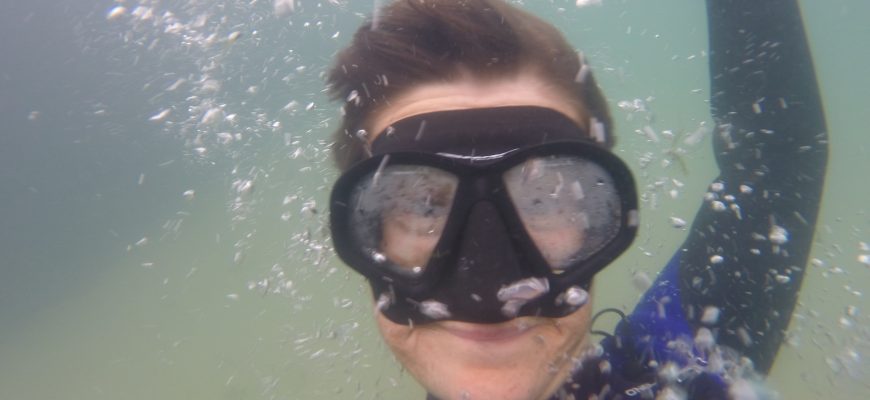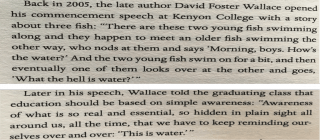
Beyond Limits
2nd September, 2016
I recently took up Free-diving in a more consistent and deliberate way. I thought it would be wise to gain some training to increase the amount of time I could spend exploring the underwater world.
This article, as you might imagine, is not really about Free-diving – it is more a series of questions relating to discoveries so far in my quest for learning. Of course, whilst I would advocate it as great fun, you may well never plan to Free-dive. By sharing a little about my experiences though, I hope you will translate how the following insights might have relevancy both within the water and on dry land within a range of contexts.
For me one thing Free-diving offers is a sense of “connected solitude”. As an activity this submergence is almost meditative and certainly requires a degree of coherence to observe your surroundings with peace and awe. The embodied cognition I sense underwater enables a freedom from limitations and access to being fully present within the moment.
“You are capable of more than you know…”
This is not a new concept /statement, indeed lots of people use this as a personal mantra when facing challenges… and I have even heard it used with a degree of flippancy. Yet it is so true… and activities that demand a high degree of mental and physical systemic engagement bring home just how little we know about our environment and our potential.
Do you push your perceived limitations? … and as a starting point… do you even know what you believe your limitations are?
Here is a fun question…
How long do you think you can hold your breath for? It is surely an easy question to answer… Right? … Wrong!
Many of us when first asked to hazard a guess at the time we could hold a breath for would struggle to give a response. So how is it possible we don’t know? Does it matter?
Surely breathing is something fundamental to living and we each already carry a high degree of knowledge, expertise and experience within this area?
Yet when asked this question – even as a qualified yoga teacher with a strong awareness of air quality and my breath… my answer was vague at best.
This question reminded me of a reference pertaining to lack of consciousness. I first came across this in my friend J’s book Blue Mind, where he made links to another of my favourite elements: water.
He quoted David Foster Wallace (DFW) as follows:

Upon diving deeper into the background of this quote… the wider speech from David Foster Wallace provided additional insight into our thinking choices and reinforced my MA discoveries that certainty is not the grail… or as DFW refers to it “Blind Certainty”.
His speech can be found in the link below and is well worth listening to… it is even more thought provoking and yet no less wisdom filled, when we consider DFW chose to take his own life a few years later.
So whilst it is true we are capable of more than we know… it can also be said that we are on a journey towards awareness…
This reflection left me with two useful questions… you might like to consider for yourself…
- What am I currently taking for granted, lacking true awareness of?
- Where is a perception of certainty limiting my potential options?
Now lets get back to water and air… two closely related elements that Free-diving offers an opportunity to connect with and explore in a very unique and conscious way.
Contemplate… What is it that makes it so hard to guess our breath hold?… and lets add “underwater” to this.
“I don’t know” can mean so many things such as (and not limited to)…
- I don’t care, I cannot see the value and I am not interested
- I have never thought about it or tried, so I have no previous experience to draw upon
- I have never considered this and I am not sure of my potential
Which if any of these bullet points above relate most closely to your mindset when asked what you might perceive as left-field questions?
Being curious is the first step to enlightenment…
We are often disconnected and lacking conscious awareness of the capability of our minds and bodies… our focus often only changes when we lose an ability that we might previously have taken for granted.
Interesting Fact: Did you know that when you immerse your face in cold water your heart rate (wisely) reduces? This response is called Bradycardia and we are all wired to respond in this way to immersion in water. This slowing down of our heart rate reduces oxygen consumption and lowers anxiety…
Interesting because…? I am often asked to coach people with phobic responses or a sense of unease around water / swimming… this anxiety and discomfort often relates to the idea of underwater submersion. Shifting their relationship with water and gaining some insight into both their physiology and thought processes when confronted with an ocean or pool creates profound shifts in both their recreational water use, but their wider lives.
Lets stick with this example of going underwater… If we are wired for our heart rate to reduce when we immerse, it stands to reason that “thought” and “breath” are forming a large part of their physical anxiety response – this is great news since these are two things we have clear and conscious ability to adjust. In effect – thoughts can get in the way. A concept relevant for all situations, you might even want to ask yourself: when, where and how are your thoughts currently holding you back?
Now don’t get me wrong – I never aim to assist people in become water-complacent… the ocean brings with it strong natural forces which require respect… through coaching we simply aim to allow their natural and instinctive positive relationship with water to “surface” as it were, in place of unhelpful mind and body chatter. Another useful insight with a question to offer… If we suppose that our natural instinct is to relate positively, you could take a moment to consider: with who or what are you currently fighting these natural positive instincts in favour of closing off?
Another useful insight I gained through Free-diving is that your body will offer signals when breath holding, to let you know CO2 is building up. Incidentally… this is not a reflection of having no oxygen, it simply is information suggesting that you might wish to make moves towards breathing. This physical signal appears a long, long time after your mind chatter has been telling you that you urgently need to breath, right now! Another great reminder– your physiology has wisdom to offer.
Testing the following three concepts, is what led to a recent personal best breath hold of 4 minutes 45 seconds.
- Your thoughts might be in your way
- Your natural instinctive relationships are positive
- Your physiology has wisdom
When aiming for longer breath holds there is a point in time when you start chatting with yourself about how challenging or difficult things might be getting. Since I know that during a static breath hold my real urges to breath come in physical not mental form, I can clearly separate ideas about breathing from a real requirement to breathe.
Finding the positive in the moment of mental challenge comes for me in the form of humour, in mBraining terms, my deeper embodied primal wisdom is like an elderly sage warmly acknowledging my head trying to protect me like a younger brother or sister. Listening with awe to the ideas it is conjuring and marveling at its creativity. It is deeply reassuring to know that my head does not have all the answers.
It is only at the point where my physiology tells me that I am building CO2 levels that I make a choice to stay a little longer submerged, but take steps towards resurfacing. My sense of knowing is in my body… knowing how to know… comes from being more consciously informed about and aware of my physiology, being more informed comes from having a curiosity about my internal and external environment.
Truth is… I still don’t know how long I can hold my breath for underwater, after all I am still pretty new to this and it is a steep learning curve. Neither do I have a huge desire to push myself to hit a particular number… so whilst I will continue to progress, anywhere between 3 and 4 minutes is surely a decent amount of time to look at a few fish and some seaweed…
I do know that holding these three insights also helped me reach a personal best Free-diving depth challenge this week… and I wonder how many areas of life outside the world of Free-diving these are relevant within?
How do you separate your thoughts from something closer to reality? Do you know enough about your potential and the environment you are operating within? Can you identify opacity within your interpretation and where you might be filling a vacuum of awareness with your own imaginings in order to minimize anxiety? NLP is great for providing tools and techniques to increase discovery.
Are you approaching the world with a sense of invitation to interact? In yoga we call this “looking for the good”.
How can you access and interpret the wisdom of your physiology? mBIT and mBraining are vehicles to align our thoughts, feelings and physiology for personally, socially and environmentally coherent living.
Without continual learning we can become fixed in ideas about what is and is not possible. We place so much attention on head based knowledge and can forget how much wisdom is inherent within us. So here is an invitation to explore for yourself your relationship between thought, environment and physiology. To expand your boundaries, exploring what you know and do not know, what you assume to be true, what you question and how conscious you are of the very reality you inhabit.
Two different experiences:
Inquisitive positive intention – informs real insight and promotes positive physical response.
Limited inquiry – creates conjured interpretations with variable physical response
I know which I would rather experience!
Floating or Drifting? Swimming or Drowning? Diving or Sinking?
Be More Water – Going Coastal; Liquid Ontology for a Fluid World!
INTENTION, ATTENTION, ACTION: Coaching for Coherence!
